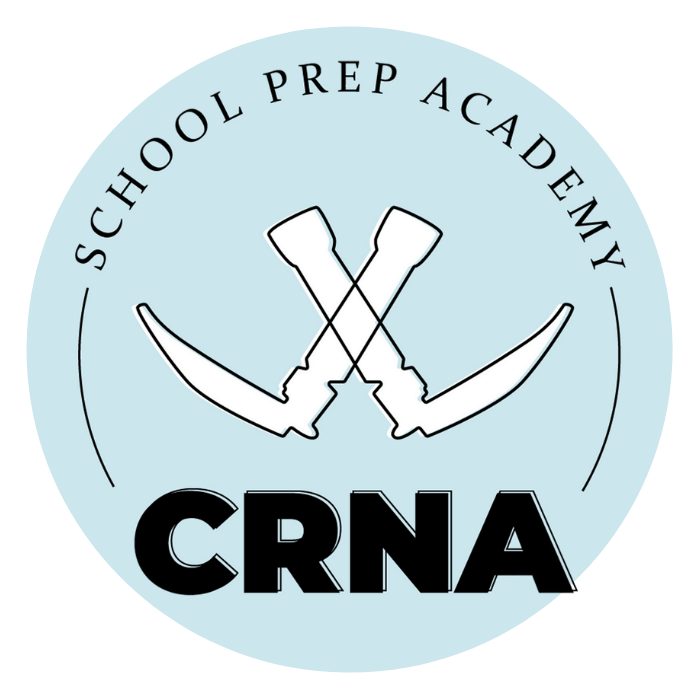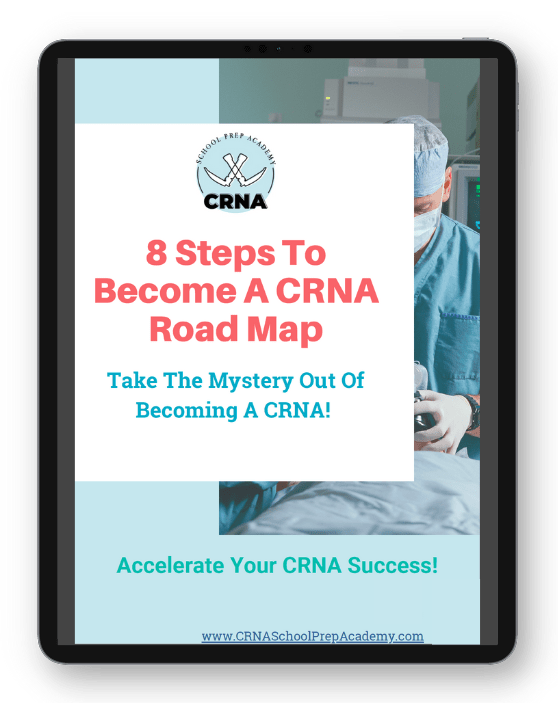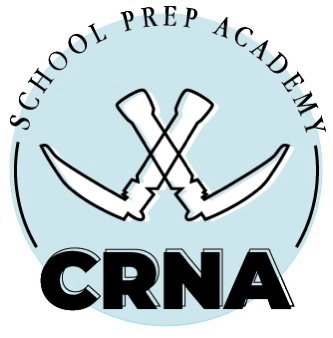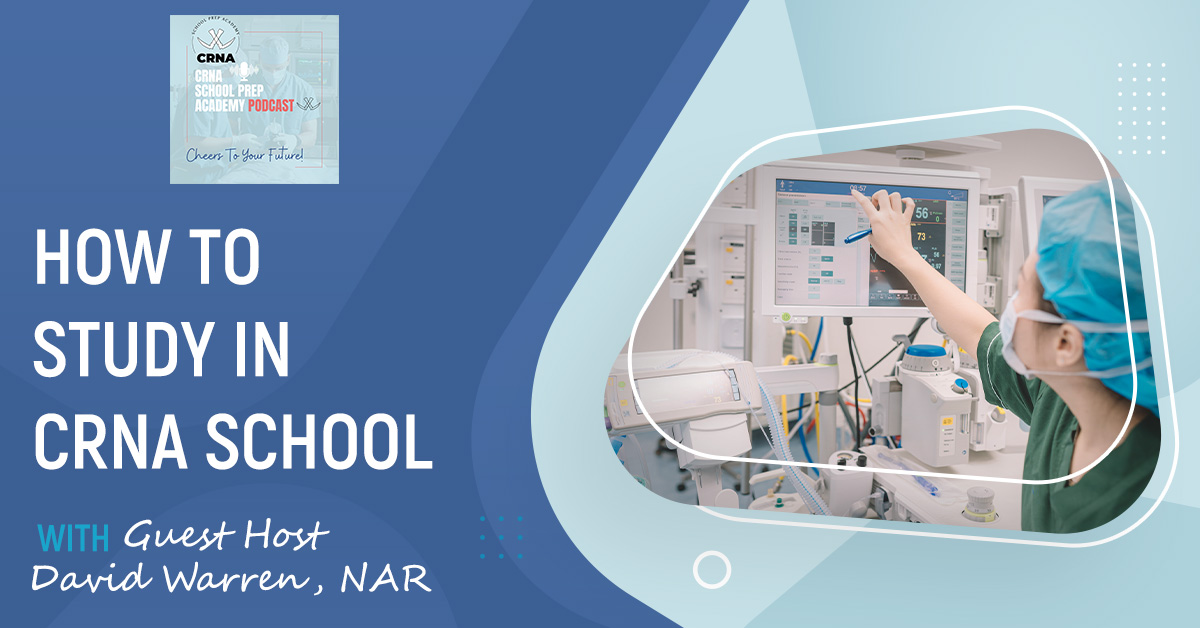
Success in CRNA school isn’t about what you study; it’s about how you study. In this episode, we have guest host David Warren, NAR, back on to share insights about being a Nurse Anesthesia Resident. Today, David guides you through the maze of study habits, pitfalls, and proven strategies for success in CRNA school. Starting with his own journey from emergency medicine nurse practitioner to CRNA student on the West Coast of California, David discusses the crucial need for a science-based approach to learning. He shares several study methods such as active recall, a game-changing technique that goes beyond memorization. David also acknowledges the time management challenge that often accompanies rigorous CRNA programs. Throughout the episode, David reveals the adaptive nature of effective study techniques, emphasizing the importance of recognizing when it’s time to pivot and try something new. In CRNA School, you’re not just regurgitating facts – you’re applying principles to real-world situations, making understanding paramount to success. Tune in now and learn the secrets to effective learning in CRNA school!
Have you gained acceptance to CRNA school? Congratulations! Prepare with the #1 pre-anesthesia curriculum, as recommended by CRNA program faculty. Start the NAR Boot Camp today: https://www.cspaedu.com/bootcamp
Get access to planning tools, mock interviews, valuable CRNA Faculty guidance, and mapped-out courses that have been proven to accelerate your CRNA success! Become a member of CRNA School Prep Academy: https://www.crnaschoolprepacademy.com/join
Book a mock interview, personal statement critique, resume review and more at https://www.TeachRN.com
Join the CSPA email list: https://www.cspaedu.com/podcast-email
Send Jenny an email or make a podcast request!
Hello@CRNASchoolPrepAcademy.com
—
Watch the episode here
Listen to the podcast here
How To Study In CRNA School With Guest Host David Warren, NAR
I have a very special episode lined up for you. It is part of our Guest Host Series, where I am bringing SRNAs on the show for you as a guest host on the show. My thought process behind doing this is I wanted you to hear from a variety of students who are at different stages of their CRNA journey and allow you to step into their world and hear them talk about what it’s like to be a student dealing with things like difficult preceptors or different anesthesia or clinical topics, maybe even things like time management, stress management, and things like that.
These episodes are going to be gold. I hope you enjoy it as much as I always do. Hearing from students, I know for a fact that the reason why CRNA Prep Academy is where it is now, and the reason why I have learned so much, is from diving all in and listening to students along with CRNAs share a wealth of information. I’m taking all of that information and compiling it into the system that we have created. I know that you’re doing the same thing by tuning into the show week after week, developing your own method, strategy, and system for success. I hope you enjoy these guest episodes. Let’s go ahead and get into the show.
—
My name is David Warren and I’ll be your guest host in this episode. We’re going to be talking about study habits, studying in CRNA School, tips and tricks, and things I wish I had known whenever I started CRNA school. A little bit about me, I was a prior emergency medicine nurse practitioner for about eight years before attending CRNA school. I’m a second-year nurse anesthesia resident out on the West Coast in California. I’m in a front-loaded DNAP program and I’m in the clinical phase. The first fifteen months of my program, we’re on campus, in person, doing all the didactic stuff for CRNA school.
I want to share with you study tips and things I’ve picked up along the way and, most importantly, what I wish I had known prior to going into CRNA school as far as study habits, all things studying, getting the content down, and taking those exams. The first thing before we jump into the content that I want to share with you is I want you to go read the book, Make It Stick: The Science of Successful Learning. This is a very intriguing book. I didn’t find this book until I was 12 to 16 weeks into the didactic phase of my CRNA program. I was getting overwhelmed and looking for resources and things that would help me study. I ran across this book. There are some YouTube reviews of it and there’s a lot of information out there on this particular book.
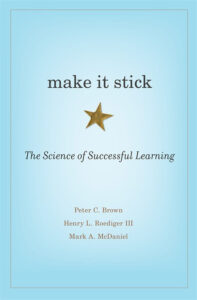
I picked it up and I read it on the break between my first quarter and my second quarter, and things drastically changed for me when I picked this book up. When I read it, I started implementing some of those things. I want to share with you a few of the things that I picked up from that book that changed my study habits. I would highly encourage you, especially if you aren’t in CRNA school yet- This is the perfect time. Pick the book up, read it, and implement some of those principles. It’s called Make It Stick: The Science of Successful Learning. It goes into the science of studying and successful learning. That’s interesting because, in our clinical practice, we use evidence-based practice on a daily basis. Especially in school, we’re learning those evidence-based practice techniques.
We don’t use that when it comes to study habits. How often do you read or hear about somebody talking about evidence-based practice when it comes to studying and retaining information? I can speak for myself and say that I had not heard of that. Everybody says do your own thing. I feel like in school, especially college and grade school, there’s not a big emphasis on teaching you how to study. It’s more of like, “Here’s the material. Learn it,” not, “Here’s the material. Let’s go through how you’re going to learn that material.” That’s not taught. A huge disservice to our culture and our country is not teaching how to study. This book delves into some of those basic principles of how to study and what the research says about the best way to study.
I find it super interesting. I crave things like this. It’s fascinating to me. Go pick that book up and read it. It will do you so well, even if you’re not going to CRNA school. If you’re going to some other professional school, you’re in nursing school, or wherever you’re at in your journey, it will serve you well. Read that first and foremost. Now I’m going to share some of the things that I wish I had known, study-wise, going into anesthesia school, and what would have helped me out. I’ve written some things down. I’m going to intermittently be looking down to get these points across to you guys.
The first thing I want to get across to you is the most important principle. It is what’s called Active Recall. If you’re not sure and you haven’t heard of active recall, it is quizzing or testing yourself. The research says that mindless note-taking, writing things down, reading notes over and over, and reading chapters in books will not help you learn. You may pick up some ideas and a few things here and there, but that’s not the evidence-based way to learn and study. Active recall is the way. Science and evidence-based practice says it’s the way to learn and study. Active recall is simply quizzing and testing yourself. I want to share with you what that looked like for me in my program and how I implemented that. Whenever we would go to a lecture, a lot of the time, our professors post a PowerPoint with a voiceover.

If we’ve been having either an online or in-class lecture, I would record that and then go back. I would pay attention to make some notes while I’m in the lecture. I would try to listen that first time around and pick up things. I would go back home and I’ll listen to it again. The second time around, on each PowerPoint slide, I would try to make note of the general idea, “What is that slide trying to get across to me?” I then would make quiz questions based on that slide. I take a blank piece of paper or I would work on a Word document on my computer and write slide 1 or slide 2. I would then make open-ended active recall questions based on what that slide said. It wouldn’t be multiple-choice questions. I’m not going to create multiple-choice questions in A, B, C, and D.
You can do that, but I will tell you now that time is not going to allow that for you if you’re in anesthesia school. I would create these open-ended questions. It’s things that I could go through and things that I can answer based on what that slide was about. I would do that for every single slide in that presentation. Sometimes it was twenty slides. Sometimes it was 200 slides. It depended on the content and what that particular PowerPoint is over. The idea of active recall is I would go through and make these open-ended questions. It’s questions that after I close the PowerPoint out, I could pull this up on my iPad and read the question. I would be able to either answer the question fully or have to go back and study that material.
I would practice, have two screens, and have my active recall questions set on one screen, and the PowerPoint on the other screen. I would go through it and try to read the question, answer the question, look back at the PowerPoint, and see if I got it. I would essentially teach myself the content that was on that PowerPoint slide. That’s how I did that. That’s one of the mainstays of how I studied. It was doing an active recall. There are several different ways to go about doing this. You can do this on a Word document. As I said, you can list slide one and list yourself questions there. Slide two, list yourself questions. You can also use certain apps. You can use apps like Quizlet and Anki. Those are good resources.
I’ll be quite honest with you. Whenever I was in school or the didactic phase of the program, it was extremely challenging for me to find the time to create this material and then study it because creating it took several hours depending on how long the content was. To try to go back and study the material was even more challenging. Sometimes, I would run out of time. I would use all of my time making these questions and then I was left with, “Now I’ve made them and the test is tomorrow.” It didn’t work that well, so you have to be conscious of your time. This particular technique worked well for me during the first couple of quarters of didactic CRNA school. That’s because our program started out with not as much material, and then each quarter, it ramped up.
By the end of the year, we had almost doubled the amount of material per quarter than we did in the first quarter. It’s like a frog and boiling water. You set them in there when it’s nice and warm, and then slowly, it starts boiling. By the end, you’re like, “This is a lot of material.” When you’re at the end of the year and you’re looking back at what you studied at the beginning of the year, you’re like, “That was not that much material at that time considering what we have now.” The thing that you might run into and I ran into as well is that time. It’s just so time-consuming with the active recall. The Anki and Quizlet apps are great if you have the time for it.
The best thing that I can tell you to do is if you have some study buddies or some friends in your class and you guys can break this content down together and each person takes a chunk, you can get it out of the way. If you’re trying to do this all yourself, it’s going to be very challenging. It’s not that you can’t do it. It’s just going to be very challenging, so consider having a friend or some buddies in a study group. Even if you’re not coming together and actually studying together, if 2 or 3 of you are working on the same content and active recall questions, it will save you so much time. Consider that if that’s something that you’re able to do if you have friends and you want to divide the content up. I did a lot of this myself, and it became a time issue.
Do you have the time to do all of this? If you have multiple people breaking things up at one time, it becomes much easier. That would be my suggestion. If you had 3 or 4 friends that you could all split this content together, the active recall questions would be much more manageable at that point. You could probably even use Quizlet or Anki. For Anki app for your computer, I believe, is $10, but the app for your phone is free. The Quizlet is free I believe for the basic subscription, but it’s $10 or $15. It would be worth your time if you have the time to do that and if you have multiple people who are willing to split that content up with you. That would be my recommendation.
Point number two is going to be your study habits are not going to be the same as they were in your undergrad degree. It’s the reality of the situation. It wasn’t even the same for me. I’ll give you my example. I obviously went to nursing school and I was in NP school. I’ve been in a graduate program already. I have taken the advanced pharmacology path, physical assessment, and then all of the management classes that go with the NP school. My studies were so different then than they are now. It changes based on the depth and the amount of material that you have. The amount and depth of material that I have now is significantly more compared to what I had in my prior graduate degree.
My study habits changed, and that’s something you’re going to have to accept and move on because there are a lot of people, myself included, that when I was in nursing school, I didn’t have to study that much. I could read the notes and go over it in my head. Those bad habits that we talked about earlier of just reading notes over and over again, according to evidence-based practice and research, are not the way to learn. That’s not the way to make it stick. I would read those notes, and that worked for me at that time, so I got away with it in nursing school. My study has changed a bit when I was in NP school. I did more of the active recall, but not to the degree that I did here in anesthesia school.
When I got to anesthesia school, I was like, “I already have my study habits down. I’ve been through this before. I’ve been through a graduate program. I’ve been in a nursing school. It shouldn’t be that bad.” When the amount of material hits, you’re like, “That’s going to change things.” Everybody goes through that. You don’t get that until you’re in that situation. I thought the same thing. I started to think it couldn’t be that bad. I was like, “What could you possibly be learning? How in-depth can it be?” When you finally get there, you’re like, “That’s legit. People weren’t lying.” It gets way more intense than you were anticipating. Your study habits will change. What worked for you in nursing school and what worked for you maybe if you have another degree may not necessarily work for you in anesthesia school. It might. You have to try and see.
For me, when I was in school in my prior programs, I would take note cards. I would either read notes over and over or take flashcards like actual index cards and write things on the back. It’s essentially what Quizlet and Anki do except the handwritten form. I would write those things on those cards and flip the cards back and forth. By the end of the year, I’d have a stack this tall of index cards. That was what I tried during that first quarter of CRNA school. I legit got index cards. I went back to my old ways and I realized it was not going to work because there was so much material. I don’t have the time of day to write down all of these things on the index cards. There’s not enough time. That’s the thing you run into.
That’s the theme across this whole episode. It is time management because time is going to get the best of you if you don’t have this stuff figured out before you hit the ground running. It did me. I remember my first exam. I was trying to do those note cards. I was like, “This isn’t working. I don’t have enough time.” I’ve gotten through half the material and I don’t have a chance to study. It was bad. Consider the time aspect of how long is it going to take you to prepare to study. We ended up thinking about how long it was going to take me to learn this material. We don’t think about how long is it going to take me to prepare to study. That’s the thing that we need to consider. It’s how long will it take me to prepare.
Point number two, your habits will change based on what they were previously. If you’re anything like me, the habits that you had before in your prior degrees may not work. They might work. You try and see but for me, they didn’t work. You have to be willing to abandon that and try something new. Point number three, you want to avoid mindless note-taking. I hinted at that earlier. You want to avoid taking your PowerPoint and writing little notes down to the side or go into slide two and write little notes down to the side. We call that mindless note-taking, and that’s not what evidence-based practice says is the best way to retain information. You will retain some information that way, but more than anything, you’ll just be making notes.
You have to be willing to abandon old habits and try something new. Click To TweetGoing back, making notes and reading your notes over and over again is not the evidence-based way to study. It’s not what research says is the best way to retain that information and to be able to produce that information on an exam. Let’s be real. On an exam in anesthesia school, it’s not going to ask you to regurgitate the content that you had on your PowerPoint slide. You’re going to have to take that information that’s on the PowerPoint slide and apply it to certain situations and principles. It’s more than just taking notes and memorizing what you write. You truly have to get it and understand it. It comes into play with the pharmacology and the physiology.
Some of the anatomy stuff, you can strictly memorize because when you’re memorizing bones, muscles, and nerves, that’s not going to change. Whenever you start learning the physiology behind that in the pathophysiology, you truly have to understand it, get it, and be able to be successful on an exam because those exam questions aren’t going to ask you to regurgitate material about physiology. It’s going to ask you to apply your physiologic knowledge to a patient situation where you may be giving medications. It may not be a direct physiology question, but to get the question right, you have to understand the physiology behind it. Avoid that mindless note-taking because that’s a bad habit to get into.

It is essentially what you’re going to be doing. You’re going to be writing things down and if you’re not truly understanding what’s going on there, it’s not going to work out. I would highly encourage you to understand what’s on that slide and not to be mindlessly taking notes about what the professor says. That’s something I learned the hard way. I did that as well. I would mindlessly take notes. I would go back and read those notes and expect to get it. What I would find out on the exam is the professor is not asking you to repeat what they said. They’re asking you to apply that principle and knowledge that you have to an exam question. It’s very different, and you don’t get that until you’re in the situation and you realize, “I way understudied for this exam.”
That leads me to my next point on this same thing. Understanding the material is the most important thing that you can do because whenever you’re in the clinical setting, you’re not going to be faced with a multiple-choice question. You have to understand those principles and those things that you learned in the didactic phase. Even when you’re in a simulation lab, you’re going to have to understand those principles that you went over and you have to apply those physiologic, pharmacologic, and assessment principles. You’re going to have to apply that to a patient situation and it’s not going to be multiple choice. You’re going to have to truly understand what’s going on.
Taking notes is not inherently bad, but if you’re just reading the notes over and over without understanding, that’s where it becomes a problem. You have to be able to understand the content. If you don’t understand the content, unfortunately, you’re not going to be successful. You can regurgitate all the content you want, but you’re not going to be successful at producing that content on an exam. Find something that works and then don’t be afraid to change it up if it stops working. That’s the thing that a lot of people run into, myself included. We find something that works and we expect it to work the entire time, and when it stops working, we fall apart. That’s something I experienced. In my first few quarters, I did the active recall thing.
Find something that works and then don't be afraid to change it up if it stops working. Click To TweetI’m putting the questions on the side, having my PowerPoint here, and making the questions. By the time my fourth quarter rolled around, there was so much information and I didn’t have enough time to prepare to study. I would start these active recall questions and I run out of time. There’s not enough time in the day for me to go through that material to create it and then study it, so I had to find something different. What I did was I started collaborating with some of my colleagues in CRNA school. We would import the PowerPoint into a Word document and then we would all take turns either writing summaries of those PowerPoint slides like the main ideas or would transcribe what the professor said into the PowerPoint slide on that Word document.
I would then use that Word Document to study. By this time around, I’d been doing the active recall question thing for almost a year now. I could look at a slide and create questions in my head. When I was looking at those notes, even though I didn’t have the questions written down, I was still coming up with questions in my head as I was studying that material to regurgitate it back to myself, explain to myself, and test myself. That’s what it comes down to. It doesn’t matter how you test yourself, but that’s the best way to do it. It is testing yourself. It’s being able to explain that material back to yourself or to somebody and being able to quiz yourself and get those questions right. That’s what I did, and you have to be willing to do that. You have to be willing to change it up if it’s not working.
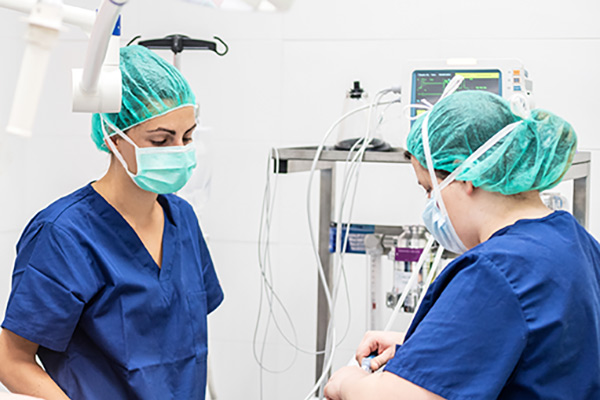
Sometimes, it’s not going to work. For instance, you run out of time. You’re not going to have time to do your notes, make your active recall questions, or do your Quizlet. You have to be able to pivot and try something different. If it doesn’t work and you realize you take an exam and do poorly on that exam, switch it up. Don’t keep doing the same thing over and over. You have to be willing to change. That’s the biggest thing that I want to get across to you in this episode. Even if it’s not working, don’t keep doing the same thing. Pivot, change, do something else, talk to your friends, see what they’re doing, and change it up.
You can't keep doing the same thing over and over if you're not successful. Click To TweetIf you’re successful and you’re doing well on your exams, obviously, keep doing what you’re doing, but if it stops working or you run out of time, you have to be willing to change, pivot, and try something different. The biggest point that I want to get across to you is to be willing to change and try something new. If it doesn’t work, don’t do it again. If it works, do it until it stops working, and then try something different. That’s what it comes down to. Again, read the book, Make It Stick: The Science of Successful Learning.
It changed my study life for the better. I spent less time studying and more time retaining the information, and it helped. Let me know your study habits or techniques. If you have any video suggestions or content you want to see, specifically for me, let me know what that is. I would love to produce content that you guys are interested in and that would help you out. Thank you so much for reading and I’ll see you next episode.
